Chief Executive Officer’s Report and Regulatory Update - July 2024
Meeting: Trust Board – Public Meeting
Date: 10 July 2024
Report Title: CEO Report and Regulatory Update
Agenda Item: PUB24/07/1.7
Author: Tom Abell, Chief Executive Officer
Lead Director: Tom Abell, Chief Executive Officer
Purpose: Information noting
Link to CQC domain:
- Responsive
- Well Led
Link to Strategic Objective:
- Be an exceptional place to work, volunteer and learn
- Provide outstanding quality of care and performance
- Be excellent collaborators and innovators as system partners
- Be an environmentally and financially sustainable organisation
Link to Strategic Risk:
- SR1a: If we do not ensure our people are safe and their wellbeing prioritised, there is a risk that we will be unable to attract, retain and keep all our people safe and well
- SR1b: If we do not ensure our leaders are developed and equipped, there is a risk that we will not be able to change our culture, and value, support, develop and grow our people
- SR2: Failure to achieve continuous quality improvements and high-quality care delivery
- SR4: Failure to deliver an efficient, effective and economic service
- SR5: If we do not clearly define our strategic plans, we will not have the agility to deliver the suite of improvements needed
- SR6: Ability to ensure sufficient capacity and capability to ensure sustainable change
Equality Impact Assessment: No negative impact identified
Recommendation: The Board is asked to note the report.
Purpose: The purpose of the report is to provide an update from the Chief Executive to the Board of Directors on the activities of the Trust since its last meeting.
Operational Improvement Plan (OPIP):
Response times for C1 and C2 patients have declined in recent months and our teams are working on a number of key impacts to improve delivery through our Organisational Improvement Plan (OPIP). These are being supported and scrutinised by colleagues in NHS England (NHSE) and our improvement plans will be discussed in more detail elsewhere on the agenda.
Response times - summary
1.1 – Improve C1 Mean Performance 1.2 – Improve C1 90th Percentile Performance 1.3 – Improve C2 Mean Performance 1.4 – Improve C2 90th Percentile Performance
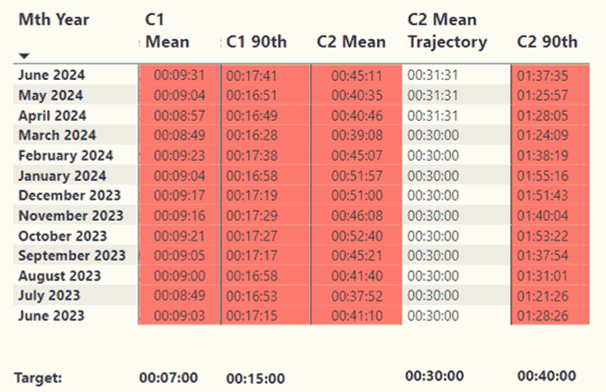
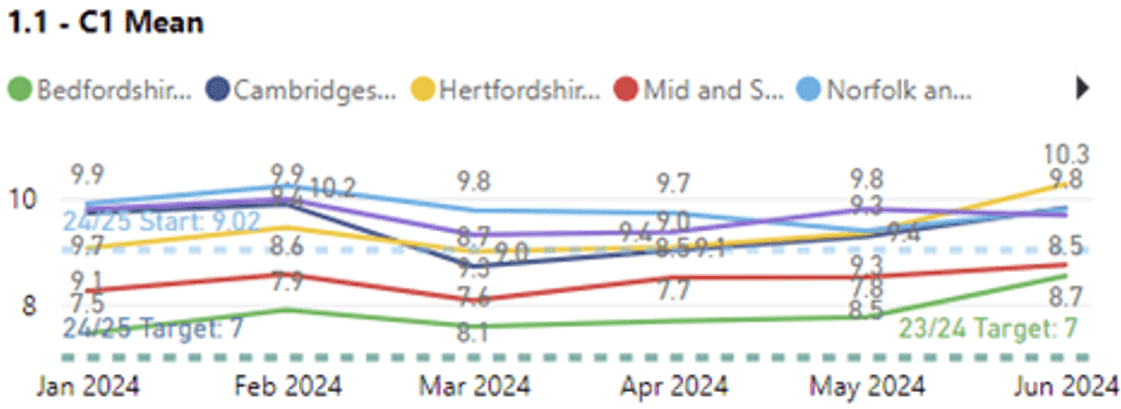

The focus areas to improve our performance and meet the targets are as follows:
- Reducing Job Cycle Times - Job cycle time (JCT) represents the total time taken to assist a single patient. The shorter the time taken the more patients can potentially be assisted. It is in the patient's interest to reduce these on-scene times (only by around 4-minutes) to provide similar care to other UK ambulance services.
- Increase Hear and Treat – The number of patients which are managed by clinicians over the phone and signposted to the most appropriate care pathway. We are recruiting additional clinicians to achieve this.
- Increase the number of Patient Facing Staff Hours by 1,000 per week. Utilising centralised scheduling to optimise planning of shifts.
- Vehicle availability – Ensuring that we have sufficient vehicles within the system to support additional PFSH. Replacing our aging fleet with new vehicles and changing the maintenance schedule for the older vehicles aiming to prevent breakdowns and issues arising.
- With the support were maintained for December despite the increase in demand indicating that the winter pressure measures instigated were effective. Weekly average Patient Facing Staff Hours were higher than for the same period last year and abstraction rates below the targets agreed as part of our Operational Improvement Plan (OPIP).
Sustainability
An update on sustainability is provided in Appendix A.
Regulatory Update
We continue to meet with regulator colleagues monthly for scrutiny of our Category 2 recovery programme (OPIP), as detailed above. We have agreed a number of key assumptions which are the levers we can utilise to improve our performance to patients. Regulators will support us with the areas such as Handover delays and call demand which are not entirely within our gift and monitor our progress with areas such as staff turnover, Private Ambulance provision and abstraction rates. Some of the key elements which are critical to us achieving the national C2 target of 30-minutes.
Implementation of the CQC’s Single Assessment Framework is being monitored by the Continuous Improvement Group with support from the Project Management Office team.
With confirmation received from the Trust’s CQC Relationship Manager that Quality Statements will need to be completed for the four core services as defined by the CQC as well as a set for the Trust overall, work has commenced on the 170 statements required.
Work has also commenced on updated guidance documents for staff which will be published in July supported by other forms of communication such as podcasts and webinars.
Executive Team
Many of you will already be aware that I am leaving the Trust next month to take a role as the Chief Executive for the Mid and South Essex Integrated Care Board. I have really enjoyed my time with EEAST and will be very sad to leave such a great team of people.
Kate Vaughton, Deputy Chief Executive Officer, will be the Interim Chief Executive Officer for the next six-months while the recruitment process to fill the role substantively is progressing.
The recruitment process for the CEO has been co-produced with our people, volunteers and stakeholders. Feedback from a staff poll, conversations, emails and focus groups have been utilised to formulate the job description, shortlisting assessment and interview questions. An update on the recruitment process will be available in the coming weeks.
Freedom to Speak Up
The FTSU function in the Trust has helped improve the culture at EEAST by providing a confidential service for colleagues to speak up.
The service has helped the Trust make significant progress in measures such as the Freedom to Speak Up Index published by the National Guardian’s Office.
We have reviewed how we can further develop our FTSU offer for staff, informed by the learning from Janice Scott and the team over the last few years.
One suggestion as part of this review has been to consider expanding the service to better reflect EEAST’s hours of operation, and most importantly, be able to preserve the independence of the service. As we continue to build towards sustainable cultural improvement, we have explored several options and have decided to explore the outsourcing of the service to a specialist Freedom to Speak Up provider.
This will mean:
- An extension of service availability to 24/7 from our current normal weekday, restricted service.
- Greater independence of an outsourced service – helping colleagues feel safer in speaking up.
- Clear regular reporting lines to the Chief Executive Officer, the nominated Non-Executive Director and Trust Board, and a continuation of our national reporting.
- More resilience of the service and better functionality, due to more resources, and tested case management software for better co-ordination of handling issues.
The current FTSU team are being supported and will continue the service as we transition to the new provider.
The number of cases over the last 3-months has dropped, with a total of 35 cases raised between 01 April 2024 and 01 July 2024.
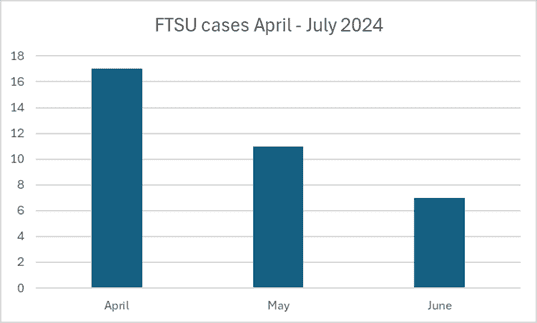
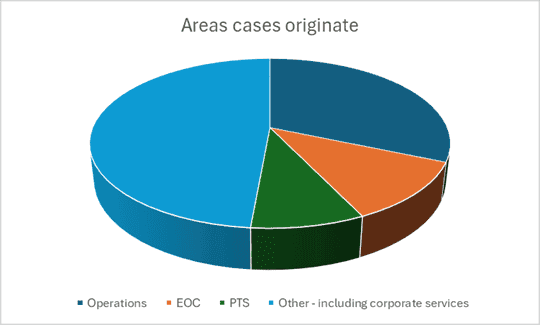
The drop in the number of cases has been shared with the National Guardian’s Office with no requirement at this time for further action.
The new service provider for FTSU starts the implementation process on 01 July with a go live date for 01 August. During the implementation process, the FTSU service will continue with the support of a specialist HR team member, where appropriate. Our people can also speak up through their line manager, and the Office of the Chief Executive. More information regarding the new service provider will be shared in the coming days.
Raising Concerns Forum
The Raising Concerns Forum met on 22 May 2024.
Flexible working has been identified as a theme for concerns raised to the forum and is a key pillar within the People Promise Programme. The committee received a comprehensive update on the process to embed new flexible working legislation. The most significant change being the changes to processes to make flexible working more accessible, equitable and fairer across EEAST. A Task and Finish Group has been assigned the responsibility of finalising the ESR dashboard and EEAST24 page for flexible working, serving as a point of reference for both staff and leaders. Following this, they will deliver training sessions to staff, leaders, and HR Business Partners to ensure a thorough understanding of the new legislation and EEAST procedures for submitting flexible working requests.
The data collected through ESR will demonstrate EEAST’s commitment to supporting flexible working, which will be evident in retention rates, regretted attrition, and improvements in staff survey results, all of which contribute to enhanced wellbeing and work/life balance.
A thematic review report provided an overview of common themes and trends from employee relation and FTSU cases over a 12-month period. The committee noted a drop in sexual harassment and bullying and harassment cases and that the HRBP team will continue to work with the People Services Analytics Team to identify ‘hotspot’ areas as well as working with leaders in this area.
The committee also received an update report on staff retention which highlighted that over the last 12-months we have experienced a significant reduction in the number of leavers from 1,144 to 608. This was attributed to various internal initiatives and strategies aimed at training and retaining staff. These include the launch of the HRBP service in collaboration with line managers, initiatives by the culture and inclusivity team, the leadership development programme, managers' passport training, enhancements to appraisal systems, as well as the implementation of both stay with EEAST and exit interview questionnaires
Engagement
Very sadly we lost our colleague Jess Micallef earlier this year. Jess began her career at Bedford EOC as a call handler, eventually rising to the role of call handler team leader (CHTL), and later becoming the Unison branch secretary for EEAST. Her passion for the ambulance service was evident in her unwavering commitment to patient care and her courageous advocacy for staff through her union involvement.
Jess will be dearly missed and fondly remembered by all who had the privilege of working alongside her or crossing paths with her.
CEO Commendations
Harley Sampson
It was great to meet Sadie Sampson and her son Harley in Southend recently to award a very well-deserved CEO Commendation. Sadie told me of her pride in her 12-year-old son who raised the alarm when her stepfather fell ill.
Sadie Sampson has spent years telling her son Harley how to call for an ambulance in a medical emergency.
And Harley knew just what to do when he heard his step grandfather, John, fall in the kitchen when he was staying at Sadie’s parents’ home in Hockley, Essex, during Easter. He found John on the ground unresponsive after hitting his head and immediately called 999, staying calm as he told call handler Kathryn d’Arcy in the Norwich Emergency Operations Centre about John’s condition and that he is a type 1 diabetic.
Thanks to Harley’s call an ambulance was dispatched as an urgent priority and was on-scene within 10-minutes.
Commendation for paramedic's son who stayed calm when calling 999
Joseph Hardy and Kathry Kent
Last month I presented Joseph and Kathry a CEO commendation in Stevenage. They were awarded for their bravery and diligence in difficult circumstances. A huge well done and thank you for going above and beyond to keep our people and communities safe.
Congratulations – Advanced Practitioners
Congratulations to five members of the advanced practice (urgent care) team who have recently completed Level 7 education which allows them to be recognised as independent and supplementary prescribers.
Tom Olley (Waveney), Mark Eardley (Cromer), Nick Williams (Ipswich), Joshua Elias (Basildon) and Simon Blackburn (Basildon) have all worked extremely hard over the last few months to achieve excellent results in this demanding module which was hosted by the University of Nottingham.
Southern Ambulance Collaboration
We held our first workshop on the Southern Ambulance Collaboration on 07 June 2024, this involved colleagues across the five ambulance services identifying priorities for joint working and learning.
More detail will be shared once the priorities for joint working has been agreed and specific projects and programmes of work have been scoped.
Other visits and engagement activities
I have continued to visit Ambulance Stations, Acutes and blue light colleagues and met with external stakeholders since my last report.
- Attended and presented at the National Volunteer Strategy Workshop
- Visited stations in Chelmsford, Chelmsford EOC, Chelmsford training and education Centre, Basildon, Southend, Barton Mills, Longwater, Hellesden, Central Avenue, Waveney Depot, Brentwood, Harlow, Watford, Welwyn Garden City, Hemel Hempstead, Stevenage, Kings Lynn, Cambridge, Peterborough, Bedford EOC, Luton and Kempston
Appendix A. – EEAST Sustainability Report for July 2024
The detail below outlines the progress made with the Sustainability Programme since our last report to the Trust Board.
Recommendations for decision
- Board to request full participation from all staff in sustainability initiatives, carbon footprint data acquisition and working groups, particularly Sustainability Working Group and weekly electric vehicle infrastructure project group.
- Request Medical Director/Pharmacist to develop clinical advice to reduce Entonox waste, as directed by NHSE.
- Committee restructure needed to ensure accountability of Sustainability Working Group.
- Request improvements in data capture and dissemination to enable the Trust carbon footprint to be developed. For example, individual personal vehicle data was not available when requested by NHSE for Greener NHS Transport Data Collection.
- Encourage all staff to undertake mandatory waste management training (compliance currently at 66%).
Trust Carbon Footprint
We continue work to improve the data acquisition, analysis and reporting of our carbon footprint. We cannot currently provide a full footprint of our directly controlled emissions (NHS Carbon Footprint) and emissions we can influence (NHS Carbon Footprint Plus). We have significant gaps in Trust-derived data, including hybrid working, non-telematics fleet, business travel, staff commuting, supply chain, etc.
Targets for our directly controlled emission sources: 5% annual reduction, total 47% reduction by 2028-2032 (2019/20 baseline) – NHS Carbon Footprint target is net zero emissions by 2040.
Fleet emissions:
- Due to increasing vehicle numbers to fulfil national response targets, our Trust-procured fuel emissions from bunkered fuel stores and fuel cards for 2023/24 have increased to 16,122 tCO2e (tonnes of carbon dioxide equivalent), 1.8% above 2022/23 levels (15,830 tCO2e). Emissions are 23% below the 2019/20 baseline, so we are still on track for net zero by 2040.
- Our fleet makes up between 40-85% of our direct carbon footprint.
- We have significant gaps in data to produce our full fleet emissions footprint and have limited business travel data, particularly for business travel submitted through expenses.
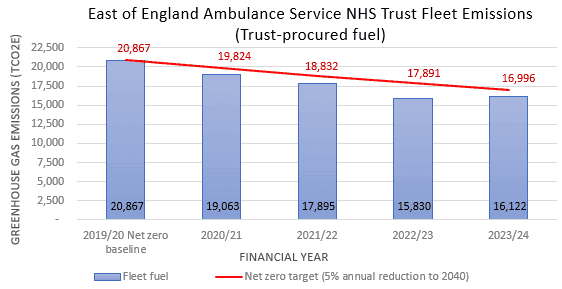
Actions
Fleet department is participating in a trial of an NHSE approved vehicle anti-idling platform called ECO-Run by ACETECH and will be the first ambulance service in the UK to take up the technology. ECO-Run monitors on-board equipment batteries and air-conditioning and heating to switch off the engine when not needed. A test vehicle fitted with the technology has been operating around Hertfordshire since February. The results show this one vehicle idled for 26 hours a month, wasting more than 31 litres of diesel. By late summer, 40 Renault Master double-staffed ambulances (DSAs) are expected to have the system fitted and all our new vehicles will include it.
Electricity and gas emissions:
- Overall, 2023/24 emissions from electricity and gas reduced by 1% to 2,787 tCO2e, meaning that we are slightly above our annual net zero target of 2,761 tCO2e.
- Transfer to electricity and gas automatic meter reading is 99% complete. This will increase bill accuracy and enable us to target further energy efficiency projects.
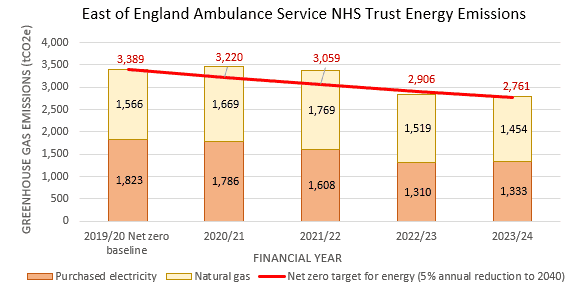
Actions
The Sustainability Team are working to reduce energy consumption.
- Energy audits: identified fifteen sites for energy audits. Completed site visits at Cromer, Potter Heigham, Peterborough, Chelmsford Office and EOC, Luton, Saxmundham and Colchester – recommendation reports to follow.
- Awareness raising: Easter Switch Off campaign resulted in 13% reduction in electricity, gas data to follow. Held a late May bank holiday switch off campaign, data to follow.
- Funding: submitted our first ever application to the Public Sector Low Carbon Skills Fund (LCSF) Phase 5. Applied for £110,970 funding for twelve sites. The LCSF is grant funding to develop a heat decarbonisation plan which we can use to apply capital funding for energy efficiency and removal of fossil fuel-led heating via the Public Sector Decarbonisation Scheme. Awaiting notification by end of July.
Nitrous oxide emissions from Entonox:
- We receive monthly Entonox (mixed nitrous oxide) usage data from our supplier which enabled us to measure our nitrous oxide emissions (which totalled 1,521 tCO2e in 2023/24), this was a 12% reduction compared with last financial year and a 27% reduction since the 2019/20 baseline.
- Anaesthetic gases, such as mixed nitrous oxide, are targeted as a priority for emissions reductions by the NHS as they are extremely potent greenhouse gases (nitrous oxide is 265 times more potent than carbon dioxide at trapping heat in the atmosphere).
Actions
- Clinical advice needs to be developed to reduce Entonox waste (College of Paramedics estimate that up to 30% by volume is wasted). Note: any returned waste gas is vented to atmosphere by suppliers prior to refilling cylinders.
- An alternative analgesic, Penthrox, is being trialled in Norfolk and Waveney. This has a significantly lower climate change impact when compared with nitrous oxide.
![Graph showing EEAST anaesthetics [entonox] emissions from 2019 to 2024](/_next/image?url=https%3A%2F%2Fcontent.eastamb.nhs.uk%2Fassets%2FEEAST_anaesthetics_entonox_emissions_2019_2024_510445183f.png&w=1420&q=75)
Electric vehicle strategy
EV infrastructure
Sustainability Manager is mobilising EV charge point management system and installation of twenty-seven dual 40kW EV chargers for operational fleet.
- Thirteen chargers are being installed at four sites across the Trust (Waveney, Peterborough, Stevenage and Southend). These are initially for Rapid Response Vehicles (RRVs) and Mental Health Response Vehicles (MHRVs).
- We are identifying suitable sites for installation of the remaining fourteen EV chargers. These will be dependent on operational need, site electrical infrastructure and fire risk assessments.
- A business case is to be developed to upgrade incoming electrical capacity and on-site electrical infrastructure to support the transition to EVs.
Fleet electric vehicles
Fleet department is transitioning our operational fleet to EVs.
- Twelve Mercedes eVito Tourer MHRVs are now being delivered to stations in clusters to support fleet servicing.
- Fifteen Skoda Enyaq RRVs coming soon.
- Three Ford E-Transit DSAs are in Germany awaiting conversion and to be delivered in 2025. Further six vehicles for 2025/26.
Reporting/Assurance
- Trust Accountability Forum: first Estates Forum held on 15/5/24.
- Greener NHS Quarterly Return: submitted 2023/24 Q4 (no changes since Q3).
- Trust Annual Report: submitted and approved, including Task Force for Climate-related Financial Disclosures (TCFD) statement to comply with DHSC’s phased approach.
- Greener NHS Transport Data Collection: submitted 2023/24 data.
- NHS Estates Return Information Collection (ERIC) return: Energy and Waste sections submitted, validation actions and final submission due by 15/7/24.
- NHS Premises Assurance Model (PAM) return: submission portal open until 13/9/24.
- NHS Standard Contract (SC18 & SC19): last review was in February, with the 2023/24 year-end review to commence.
- Greener NHS Green Plan Self-Assessment: Sustainability Manager to liaise with subject matter leads for 2023/24 year-end review.
Sustainability Team updates
- Sustainability Working Group: held bi-monthly meeting with social value presentation.
- Apprenticeships: coordinating sustainability apprenticeship programme via LDN Apprenticeships – Trust Insight Session on 27/6/24 (26 registered interest to date, 3 applications). Fifteen-month programme starting September, Trust will be one of the first cohorts for new apprenticeship.
- Transport: joined First Bus Community Travel Club, giving Trust staff in Norfolk, Suffolk and Essex discounted bus travel.
- Engagement: four sustainability pilot sites identified by Green Champions: Cambridge, Southend, Waveney and Peterborough.
- Communications: coordinating activities with national campaigns, advertised Cycle to Work salary sacrifice scheme as part of National Bike Week, Clean Air Day website article about the Trust being the first in the UK to adopt anti-vehicle idling technology. Sustainability featured in 27/6/24 Executive Q&A.
- Wellbeing gardens: Costessey Community Gardening Club have agreed to maintain Longwater garden. Investigating other community groups to help maintain gardens.
- Green Champions Network: we have 30 active members, 18 new, contacting a further 14. Network meeting held on 24/6/24.
- Collaboration: raised new LDN Sustainability Apprenticeship programme with ICB partners and ambulance sector.
Other updates
- Bury St Edmunds Hub: practical completion on 11/6/24, first site to achieve the independent environmental assessment BREEAM Excellent. Site has no mains gas supply, using air source heat pumps for heating and hot water, solar PV, covered cycling parking, planting uses native species, wellbeing garden and EV charging bays.
- Procurement and contract management: Procurement department have contracted Social Value Portal to develop the Trusts social value framework and KPIs with Trust-wide collaboration.
- Waste: We now dispose of more offensive waste than clinical waste and are on track to achieve the NHSE target of 60% conversion of clinical waste to offensive waste by June/July. Recycling increased by 4.7% since April (overall recycling rate was 24% in May). However, significant improvement is needed in mandatory staff waste training as compliance is only at 66%.
- People Services: IT Spring Clean amnesty completed at 22 sites in March, received 82 items with 32 being reused saving the Trust £11,281. Carbon impact to follow.
- Capital projects: electricity-producing solar PV panels with battery storage are being installed at Peterborough and Longwater.
Author: Katherine Middleton, Environment and Sustainability Manager
Approver: Zoë May, Head of Business Relationships Published: 1 July 2024
